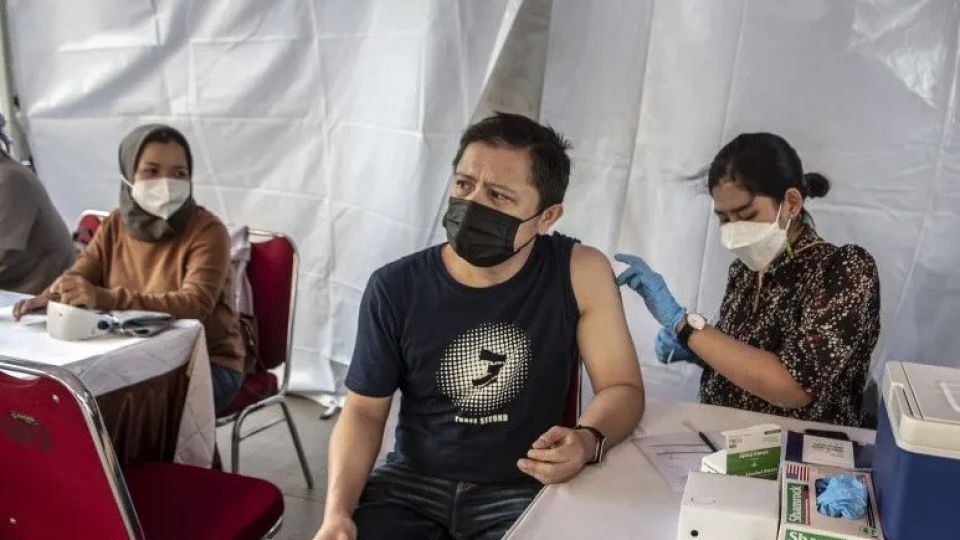October 27, 2022
JAKARTA – Epidemiologists have urged the government to bolster the third dose rollout and address vaccine shortages as Indonesia faces a possible new wave of COVID-19 infections triggered by the new and highly contagious XBB, a subvariant of Omicron.
By Wednesday, the Health Ministry had recorded four local transmissions of the XBB subvariant, affecting three women living in Jakarta and one in Surabaya. The patient in Surabaya, who tested positive on Sept. 26, had the country’s first confirmed case of the subvariant. All four patients have now recovered. XBB is another subvariant of the highly transmissible Omicron variant that has been driving up cases in Singapore in recent weeks.
XBB is said to be the most antibody-evasive subvariant to date, although so far there is no evidence that it can cause more severe illness in people who had immunity from a previous infection or vaccines. Some scientists believe XBB is more contagious than BA.5, another Omicron subvariant that triggered a wave of infections in Indonesia in July and August.
According to the Health Ministry spokesperson Mohammad Syahril, XBB infections are soaring rapidly in Singapore with the daily caseload having reached 0.79 times the peak of the BA.5 wave in the neighboring country.
“So far the XBB subvariant has been detected in 26 countries, including Indonesia. It has caused a sharp increase in cases in Singapore while hospitalizations are trending upward there, although deaths remain very low,” Syahril told a press conference on Wednesday.
He earlier said that 24 out of 37 provinces in Indonesia had reported a rise in COVID-19 transmissions in the past week. The country recorded 3,008 new cases on Tuesday. It was the first time Indonesia reported more than 3,000 cases since Sept. 8.
“However, we will still be monitoring [cases numbers] over the next few days, and the ministry is conducting whole genome sequencing to see whether XBB has become dominant here,” he said.
Booster dose crucial
Epidemiologist Windhu Purnomo said that it was very much likely that the XBB variant had been spreading widely among the public and the confirmed cases were only the tip of an iceberg.
“The new sub-variant will very likely trigger another coronavirus wave in the country. Although I’m sure that hospitalizations and fatalities will remain quite low, vaccination – especially the booster dose – remains crucial to maintaining public immunity against the virus,” Windhu said.
As of Tuesday, only around 35 percent of the country’s 181.6 million target recipients over the age of 18 had received a third dose. Public demand for vaccination has been drastically dropping since April of this year despite the government’s various efforts to boost rollout.
“Vaccination, indeed, is part of our strategy to end the pandemic,” Syahril said.
Vaccine shortages
Epidemiologist Dicky Budiman said that aside from ramping up the booster coverage, the government should also consider expanding the fourth dose rollout to the general public and not only to health workers.
“Vaccine-induced immune response to COVID-19 wanes in four to five months after injection,” he said. “Although XBB typically only causes mild symptoms, the lower someone’s level of antibody against the virus the higher their risk of developing severe symptoms, especially among vulnerable groups such as those with underlying health conditions, the elderly and pregnant women.”
However, he noted that bolstering booster dose uptake and expanding fourth dose eligibility would be impossible to do unless the government addressed shortage issues that have been haunting the country’s vaccination campaign in recent weeks.
Health agencies across the country – including in Jakarta, Central Java, South Sumatra, Aceh and South Kalimantan – have all reported vaccine shortages over the past few days, according to media reports.
The ministry’s director for pharmacy management and services Dina Sintia Pamela said Indonesia had only about 500,000 vaccine doses remaining but promised that authorities would replenish stocks before the end of the month.
“The Health Ministry is relocating [the currently available] vaccine stock [to areas that need them the most], and shipments of 5 million vaccine doses have begun to arrive in the country and are expected to be complete next week,” she said, referring to deliveries of the Pfizer vaccine through global vaccine distribution initiative COVAX.
Behind the dip in reserves is a shift away from vaccine imports in favor of procuring locally produced vaccines such as the IndoVac and AwCorna doses as part of Indonesia’s long-term goal of achieving vaccine independence.
— Dio Suhenda contributed to the story


